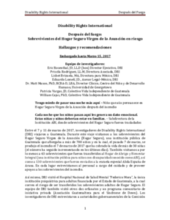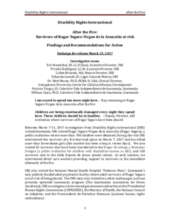This page contains documents and other resources related to children's care in the Americas. Browse resources by region, country, or category.
Displaying 2381 - 2390 of 3191
Efforts to privatize Texas’ foster care on hold while the state investigates whether or not the process was compromised by wife of the former inspector general.
A Washington Post op-ed piece written by Eric Rosenthal on why orphanages should be eliminated.
This article provides a detailed account of the tragic fire that occurred on March 8, 2017 at the Virgen de la Asunción home in Guatemala.
Article from Tuscon.com reporting that federal judge has thrown out challenge to Indian Child Welfare Act.
Nine survivors of the children’s home fire in Guatemala were flown to the U.S. for burn treatment.
The political situation in the U.S. drives unaccompanied minors across the border to Canada where their futures are uncertain.
Entre el 7 y 11 de marzo de 2017, investigadores de Disability Rights International (DRI) viajaron a Guatemala para entrevistar los sobrevivientes de vivienda institucional. Este documento presente la información recopilada y las recomendaciones de DRI a Guatemala.
DRI’s main finding is that survivors of the fire at Hogar Seguro Virgen de la Asunción face immediate danger – including detention in other institutions where they face continued segregation and abuse.
This article from Mission News Network covers the complicated history of orphanages in Guatemala.
An account of the corruption behind the tragic fire in Guatemala that ended with the death of at least 37 girls.



